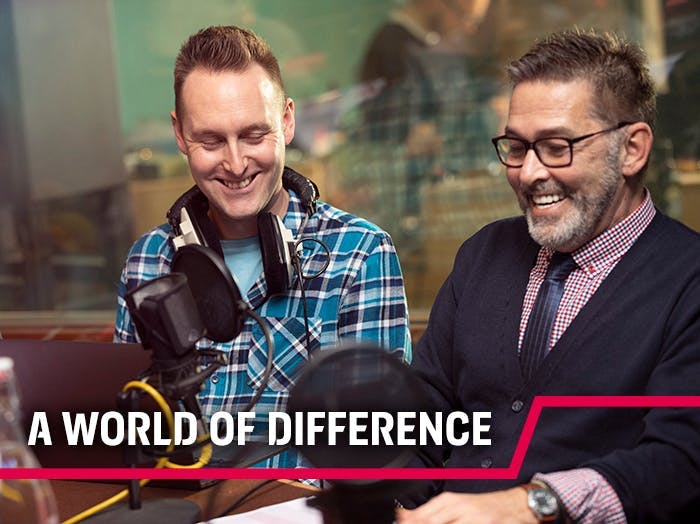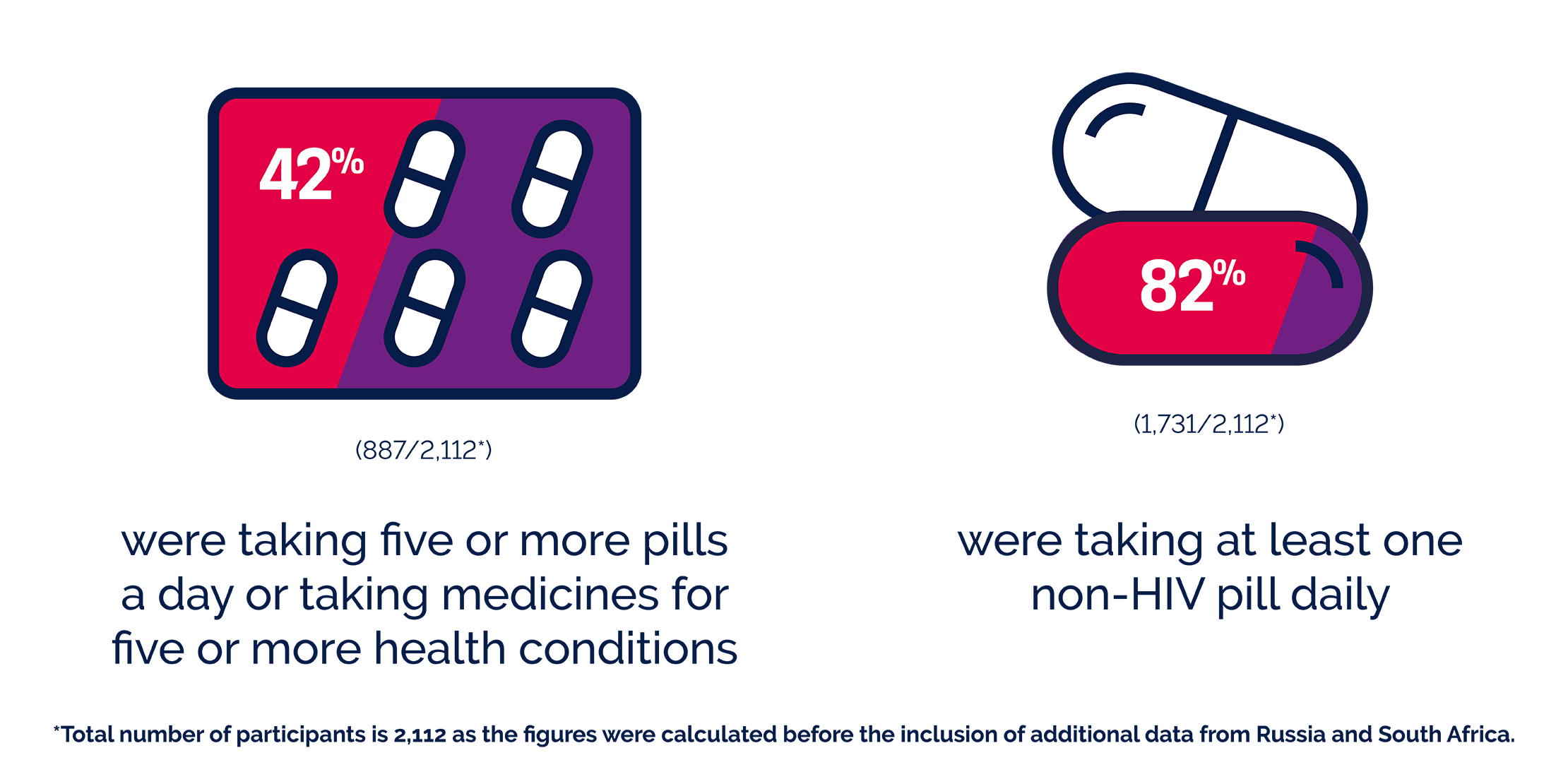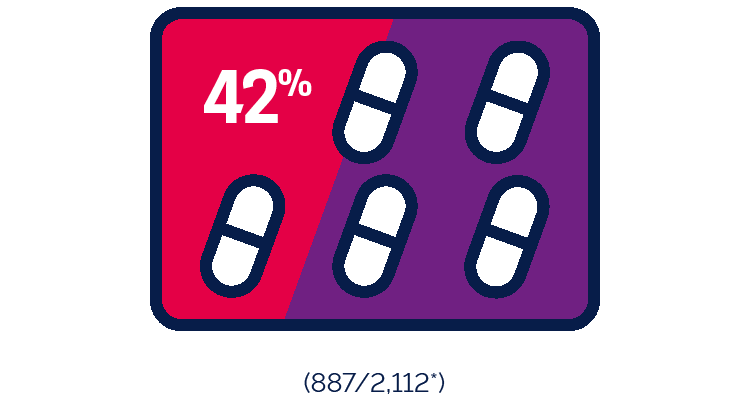THINKING ABOUT YOUR LONG-TERM HEALTH
Thanks to advances in HIV treatment and care, having a long, healthy life is an achievable goal for most people living with HIV today.1
However, as HIV life expectancy continues to increase, our health priorities and treatment needs may change.
Starting the conversation about your future health now and planning ahead with your healthcare team can help you make sure that as you grow older, you aren’t just living well with HIV, you’re thriving.
It’s never too early
To ensure you remain as healthy as possible when living with HIV, it’s important to think long-term about your health – and there’s no better time to start than now.
No matter how old you are or how long you’ve been living with HIV, being proactive in your HIV treatment and speaking regularly with your healthcare team can help ensure your evolving needs are met.
HIV treatment over a lifetime
HIV is a lifelong condition and people living with HIV can look forward to just that: a long life.1 Whether you were born with the condition or you were diagnosed in your 50s, you can expect a happy and healthy life. In fact, as long as you are diagnosed in good time, continue to take your treatment as prescribed, and look after yourself, the life expectancy for someone living with HIV is the same as for everyone else.2
“It’s all about making sure as I age, there are more treatment options that are kinder on my body.”
Many people living with HIV have concerns about the impact of taking medication over a lifetime – this is often referred to as long-term side effects.
It’s natural to have concerns about how treatments may impact the future of your health when you live with a long-term condition like HIV. In fact, the Positive Perspectives study found that 68% of people were worried about the long-term effects of HIV medicines.3
Regular conversations with your doctor and connecting with HIV support groups can help to ease your concerns. Understanding your treatment options can also help you make more informed decisions about your HIV treatment and care.



It’s important to remember that, if your current HIV treatment doesn’t suit you or your lifestyle, you can speak to your doctor about changing it. Treatments are continuously improving to become a smaller part of your life. 73% said that they were open to the idea of taking a HIV treatment with less medicines, as long as they remained undetectable.3
If you have concerns about long-term side effects or your health, talk to your healthcare team. You and your doctor can work together to find the combination that is right for you and may save you taking more medicines than you need to.
Knowing what’s best for you
Tom discusses his concerns about the long-term effects of medication and the importance of working closely with his doctor.
Planning for a healthy future
HIV treatment is always evolving and improving, so keeping up to date with the latest advances and regularly reviewing your options with your doctor is a good way to look after your long- term health.
Even if old age is half a lifetime away, you may have still been living with HIV for a long time. It’s never too early to think about your long, healthy future. Working with your healthcare team on your long-term treatment goals can ensure that as your needs change over the years, your treatment does too.
Thinking long-term
Hear Hans and Xiana share their thoughts about their long-term health and their hopes for future treatments.
Speak to your doctor about your long-term health goals and start planning for your future health.
LIVING WITH HIV OVER 50
It is currently estimated that around 25% of people living with HIV globally are aged 50 and over, and this number is increasing.4
As a natural part of growing older, people living with HIV often have to manage other health conditions along with HIV – but that shouldn’t impact what you can do or how you feel.
There are lots of ways you can ensure you age well with HIV. From staying social to partnering with your healthcare team to manage multiple medications, here are some top tips for staying healthy in mind and body in your fifties and beyond.
Looking after yourself as you age with HIV
Read these top tips from people living with HIV to help keep your body, mind and soul in great condition.
We know that you could have been living with HIV for 25 years or more and today be any age (including 25!), so whilst these tips were written for older members of the community, they are a great starting point for anyone living with HIV.
Stay healthy with George
George, now in his nineties, talks about how, with the help of his husband Somchai, he’s ensured he is on the best HIV treatment for him throughout his life so he stays as fit and healthy as he can.
If you have any concerns about managing your health as you grow older, chat them through with your healthcare team.
MANAGING HIV ALONGSIDE OTHER CONDITIONS
Thanks to advances in HIV treatment and care, HIV life expectancy has improved exponentially. We’re now seeing the first generation of people living with HIV entering later life and accessing later life care.7
As we all get older, regardless of HIV status, our health gets more complicated. People living with HIV can develop the same age-related conditions that affect everyone such as heart disease, kidney disease, liver disease or diabetes. Living with a chronic condition like HIV, also increases the risk of developing other health conditions and certain cancers.2,8
Co-ordinating your care and balancing the medications for these conditions alongside your existing HIV treatment is an essential factor in maintaining a high quality of life as we age.9
Keeping your doctor up to date
Here, Xiana talks about the importance of telling her doctor about her healthcare needs as they evolve over time.

POSITIVELY THRIVING
A World of Difference
In this clip from the Positively thriving podcast Tom, Brad and Bryan talk about long-term health, ageing well with HIV, and the benefits of being completely open with your healthcare team.
Listen to the full episode of Positively Thriving: A World of Difference.
HIV & other conditions
There are some health conditions that people living with HIV have a higher risk of developing. Even common illnesses can be more serious for people living with HIV – they can get worse faster than they normally would.
A lot of these illnesses are easily treated, but some of the medications can affect how well your HIV treatment works. It’s important that if you do develop an illness that you’ll need to take medication for, or that is affecting your health and wellbeing, you talk to your healthcare team about it as soon as you can.
Taking multiple medications (polypharmacy)
The longer you live with HIV, the more likely it is that you’ll need to manage different health conditions (comorbidities).
People ageing with HIV experience many of the same health problems as the general population but are also at higher risk of certain conditions such as cardiovascular disease or osteoporosis.11 This means they are more likely to have to take additional medication along with their HIV therapy.
The impact of taking multiple medications
In the Positive Perspectives study people living with HIV shared their experiences of taking multiple medications or ‘polypharmacy’ – that means taking five or more pills a day or taking medicines for five or more health conditions.3
Of the people living with HIV in the Positive Perspectives study:





The study results showed a strong link between polypharmacy and poorer health, wellbeing and treatment satisfaction.
“I’m hoping that very soon we’ll have long-term therapies so that we don’t have to take medication every day. I would want medication which I could take like once in a year.”
If you have any concerns about managing multiple medications or your future health, talk to your healthcare team.
Switching to a new HIV treatment may be something to consider if your circumstances change to make sure your treatment continues to work for you and your lifestyle. It might be that you’ve started taking medication for another condition and you’re experiencing side effects, or simply that you’d like to move to a treatment that is better for you and your long-term health. You can start the process by chatting through any worries, challenges, or life changes you have experienced with your healthcare team.
Even if you don’t have a specific reason, reviewing your treatment from time to time with your healthcare team can be a good thing. Your quality of life is important and staying healthy and undetectable as you get older is a big part of this. Reviewing your medication helps ensure that you’re always on the best option for you and your long-term health.
You can find out more about the benefits of staying undetectable on our U=U page.
Speaking to other members of the HIV community about their treatment experiences can also be a big help. Discover Robert’s advice for ensuring you’re on the best treatment for you.


What's next?
Understanding the different types of HIV medications available to you can make it easier to talk to your doctor about your treatment options.
Different medicines can cause different side effects: short-term, longer term, drug-to-drug interactions. These may be the result of the drugs being used to treat HIV – not because you’re doing anything wrong.
- National Health Service. Treatment – HIV and AIDS. Available at: https://www.nhs.uk/conditions/hiv-and-aids/treatment/ [Accessed: November 2021].
- NAM AIDSMAP. Life expectancy for people with HIV. Available at: https://www.aidsmap.com/about-hiv/life-expectancy-people-living-hiv [Accessed September 2021].
- Okoli C, et al. Prev Chronic Dis. 2020;17:190359
- UNAIDS. Get on the fast-track. The life-cycle approach to HIV. Available at: www.unaids.org/sites/default/files/media_asset/Get-on-the-Fast-Track_en.pdf. [Accessed September 2021].
- World Health Organisation. Physical activity. Available at: https://www.who.int/news-room/fact-sheets/detail/physical-activity [Accessed September 2021].
- Gallagher M, et al. Front Psychol. 2015;6:1281.DOI: 10.3389/fpsyg.2015.01281.
- Psychology. HIV/AIDS in Later Life. Available at: https://oxfordre.com/psychology/view/10.1093/acrefore/9780190236557.001.0001/acrefore-9780190236557-e-430?rskey=KlnJN6. [Accessed September 2021].
- National Health Service. Living with HIV and AIDS. Available at: https://www.nhs.uk/conditions/hiv-and-aids/living-with/ [Accessed September 2021].
- Althoff K, et al. Curr Opin HIV AIDS. 2016;11: 527–536.
- NAM AIDSMAP. End-stage liver disease is a concern for people with HIV and hepatitis B or C co-infection. Available at: https://www.aidsmap.com/news/apr-2015/end-stage-liver-disease-concern-people-hiv-and-hepatitis-b-or-c-co-infection [Accessed November 2021].
- Burki T. Lancet HIV. 2019;6:e816–e817.
Title
Word Type
Sub Heading
definitionTitle
Word Type
Sub Heading
definition



